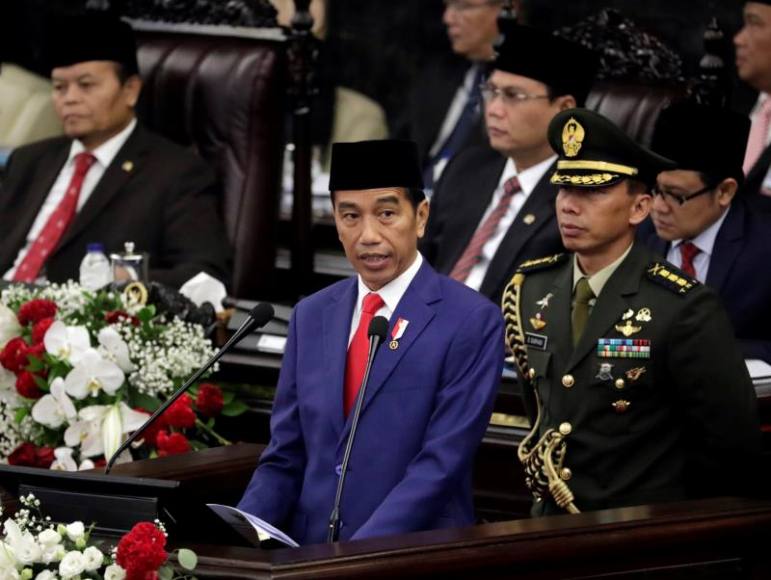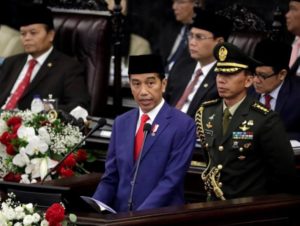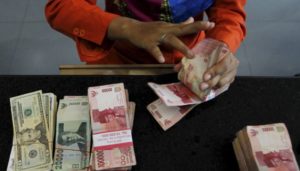Jakarta, MINA — Amid rising external pressures, Indonesia’s economy is expected to expand by 5.3 per cent next year on the back of stronger domestic consumption, investment inflows and export growth, The Straits Times quoted President Joko Widodo as telling Parliament Thursday..
And this growth will be oriented towards ensuring greater equality across the country by accelerating development in eastern Indonesia, border areas and less developed regions; strengthening the local economy in villages and rural areas; and intensifying efforts to address poverty, he said in a speech announcing details of the proposed 2019 state Budget.
To support its growth target, the government has earmarked 2.44 quadrillion rupiah (S$230.1 billion) for the state budget next year, up 10 per cent from the figure estimated for this year.
Also Read: Saudi Arabia Wins Bid to Host World Expo 2030
“The quality of state spending will be improved and focused on stimulating the economy and creating people’s prosperity in a just and equal manner,” Mr Joko said.
Close watch on cost, social security
The administration will also keep inflation at between 2.5 per cent and 4.5 per cent, and this will enable the population to meet its basic needs, especially by ensuring affordable food prices, he added.
Also Read: 148 Products from Indonesia Promoted at Sarawat Superstore Jeddah
In addition, it expects to maintain people’s purchasing power through various social security programmes, especially for the poor and low-income segments of the population.
South-east Asia’s largest economy expanded by 5.07 per cent last year and the government anticipates that it will grow by only 5.18 per cent this year, down from the 5.4 per cent projected earlier.
Weak household consumption and a global commodity slump have put the brakes on Mr Joko’s ambition of achieving 7 per cent economic growth – a figure set when he came into office in October 2014.
In his first year in office, the economy expanded by 4.8 per cent, its slowest pace in six years.
Also Read: Packaging Industry Supports Halal Ecosystem
However, growth picked up to hit a five-year high of 5.27 per cent in the second quarter of this year, bringing the overall growth for the first half to 5.17 per cent.
Inflation, a key macroeconomic indicator, also appears in check, with the central bank’s target range at between 2.5 per cent and 4.5 per cent.
Poverty down, investor condidence up
Also Read: Indonesia-Japan Agree on Energy Transition Cooperation
Mr Joko, who is seeking re-election in next year’s presidential poll, also highlighted several achievements of his administration that have been made possible by the robust economic growth of around 5 per cent during his four years in office.
They included a fall in the poverty rate to a historic low of 9.82 per cent in March, or 25.95 million of the total population of 260 million.
Furthermore, the Gini coefficient, which measures income inequality, slid to 0.389 in March, the lowest in six years.
Mr Joko’s massive infrastructure push and efforts to enhance the ease of doing business have also helped boost investors’ confidence in the country, which still depends heavily on commodities, such as palm oil and coal, to secure its foreign earnings.
Also Read: Dubai Expo 2020 Holds Special Event for Palestine
The government is set to spend 420.5 trillion rupiah from the 2019 state budget to continue the construction of infrastructure across the nation of over 17,000 islands, which will include roads spanning 667km, toll roads stretching 905km and 48 dams.
Challenges on the horizon
However, other major challenges, particularly a further depreciation of the rupiah and a widening current account deficit, linger in the wake of the recent market rout in Turkey, triggered by its escalating trade spat with the United States.
Also Read: Indonesia Increases Excise on Tobacco Products by 2022
In response to the latest development, Bank Indonesia pushed up its benchmark interest rate by 25 basis points to 5.5 per cent on Wednesday, in a bid to contain the deficit and maintain confidence in the financial markets.
Mr Joko said that given current external challenges, such as attempts to safeguard monetary stability in the US and Europe and ongoing developments in China, the government expects the local currency to stay at around 14,400 rupiah to the US dollar. The rupiah settled at 14,593 rupiah per US dollar at the close of trading yesterday, according to Bloomberg.
Dr Piter Abdullah Redjalam, research director at Centre of Reform on Economics Indonesia, told The Straits Times that the government has put a realistic growth target, along with moderate macroeconomic assumptions, in the proposed 2019 budget.
“It has set modest goals after considering domestic and external factors,” he said. “In 2019, there will be high uncertainty because of a US-led trade war and ongoing developments in Turkey that may escalate into a crisis and bring contagion to other regions, primarily the Middle East and Europe.” (T//RS5/RS1)
Also Read: Indonesia to Become the Center of Sharia Economy in 2024
Mi’raj Islamic News Agency (MINA)
































 Mina Indonesia
Mina Indonesia Mina Arabic
Mina Arabic